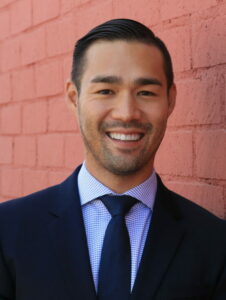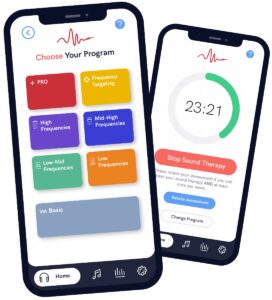Two years ago, Jon Brown, the owner of a recording studio, noticed that his hearing had deteriorated to the point where he had to redo sound edits. So, while at a Costco store he went in for a hearing test.

“They scared the daylights out of me,” Brown said. “They told me that it will never get repaired and that I needed hearing aids immediately, otherwise my hearing loss will get much worse very quickly. I freaked out – that was like telling a painter he could not use his hands.”
But hearing aids were still by prescription and expensive – at least $1,500 a pair, with higher-end models going for three times that – so he held off getting them.
Nine months later, after a particularly loud recording session at his Van Nuys-based Archwood Music studio, Brown had a bad attack of tinnitus that lasted for days.
That’s when a friend told him about a new hearing therapy being developed by Chris Ellis.

The therapy was available as a smartphone app delivering sounds just beyond the user’s hearing range. After repeated exposure, dormant auditory nerve pathways begin recovering, allowing hearing range to expand.
Brown said he tried the app, but the tinnitus was too loud on the first go around. So, after the tinnitus subsided, he tried the app again.
“I noticed my physical ear pain went away the next day and the ringing in my ears got less each time I tried the app,” Brown said. In three months, he scored 15 percentage points better on hearing tests.
Ellis’ app is the centerpiece of Santa Monica hearing therapy company AudioCardio Inc., which he co-founded in 2018 with a scientist from South Korea named Sam Kwok.
Inaudible therapy
Ellis had become interested in treating hearing loss a decade ago after his experience as a caregiver for his grandfather, a U.S. Air Force engineer who was battling dementia. Ellis came across a study claiming hearing loss can lead to dementia and believed his grandfather’s hearing loss accelerated the dementia.
In 2016, Ellis was introduced by a mutual friend to Kwok, who had developed an algorithm based on a person’s hearing ability that would play personalized and inaudible sound therapies just below that person’s audio level. Over time, as the audio neural pathways get stimulated repeatedly, the person starts to hear these sounds.
“Conventional hearing aids work by amplifying sounds to the point that you can hear them distinctly,” Ellis said. “But they don’t correct the underlying hearing. That’s what this algorithm does: it treats hearing loss without amplification.”
The pair decided in 2018 enough progress had been made to launch a company, which they called AudioCardio. The aim was to provide a lower-cost alternative to treating hearing loss.
The plan was two-fold: one track involves having people who suffered from hearing loss subscribe to the app. There are two subscription levels: the basic $10 per month level allows the user to work on five different sound frequency ranges in succession; the other $15 per month level allows the user to access up to eight frequency ranges and to engage two frequency ranges simultaneously.
While most customers experience a plateau in their hearing improvement after several months, Ellis said that the app should be used well beyond that point in order to maintain the newly expanded hearing range.
The other track involves continuing the studies and seeking funding for clinical trials, with the aim of securing Food and Drug Administration approval that would allow for more robust claims about the benefits of the audio therapy. Currently, the app is being marketed as a general “wellness” product.
Overcoming hearing aids
The app was launched in January 2020 and now has more than 5,000 subscribers. It has had to contend with the dominance of hearing aids to address hearing loss.
“The model behind hearing-loss treatment is still hearing aids being bread and butter for people with hearing loss,” said Kory Castro, co-founder of Casmin Hearing Group in Scottsdale, Arizona.
The hearing aid industry is dominated by about a half-dozen global players with huge marketing budgets. Castro said these “big six” companies tend to buy out smaller innovative firms, such as AudioCardio.
Last year the Food and Drug Administration approved the sale of hearing aids without the need for a prescription. That move is expected to lead to dramatic drops in hearing aid prices over time and significant improvements in hearing aid technology, such as customized fine-tuning of the hearing aids.
One of the big areas of focus now with hearing aids is on connectivity with smartphones and other devices, according to Catherine Palmer, director of Audiology and Hearing Aids at the University of Pittsburgh Medical Center and past president of the American Academy of Audiology.
It’s against this rapidly changing backdrop that AudioCardio is seeking funding for the clinical trials necessary to obtain FDA approval. Ellis said the clinical trials will likely take three to four years to complete, at a cost of $30 million to $40 million.
“We don’t have the funds to do this, so besides just raising capital, we’re looking at licensing our technology to consumer brands,” he said.
